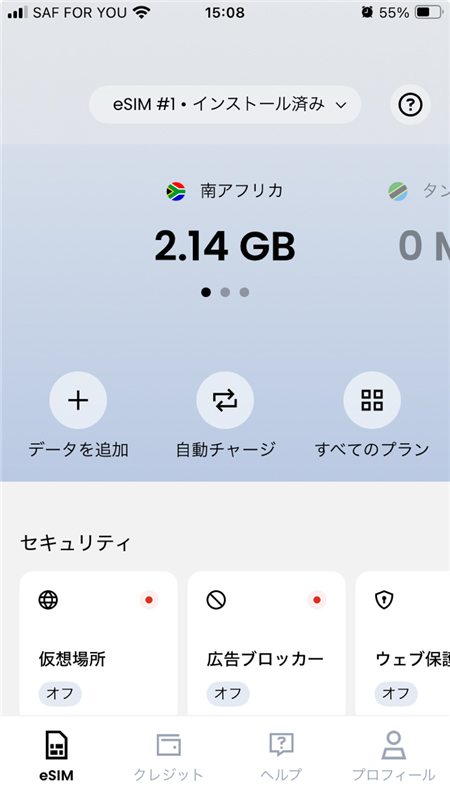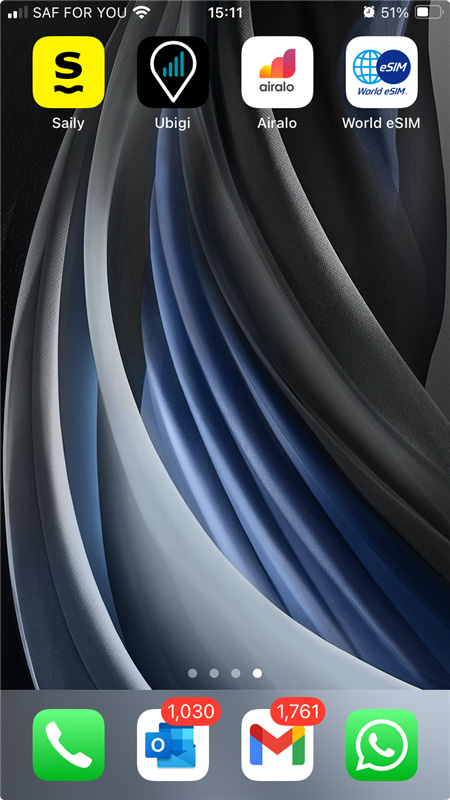If you've ever traveled within Africa for business, you've likely faced the dilemma of "how to secure a reliable internet connection for your smartphone." Many people rent "mobile Wi-Fi" devices when traveling from Japan to places like Africa, but within Africa, such rental services are generally unavailable (possibly due to the high risk of devices not being returned properly).
I used to buy local SIM cards at the airport upon arrival, lining up at the telecom counter. But this can be surprisingly cumbersome.

Counters can be crowded, leading to long waits. In countries where English isn't widely spoken, communicating with "English + gestures" to choose a plan is time-consuming. Opening the SIM slot and swapping physical SIM cards can be a bit stressful.
Recently, I've been saved by the option of "e-SIM."
What is an e-SIM? e-SIM stands for "Embedded SIM," a new system that eliminates the need to insert a physical SIM card. Smartphones have a built-in chip that can store SIM information, allowing you to select a plan and activate it online via an app. In other words:
No need to buy a SIM card. No need to swap SIM cards. Instant activation (usually within 3 minutes)
Roaming Risks High Charges... Another reason e-SIM is convenient is that it's "far more secure & affordable than roaming." Enabling international roaming and using your smartphone abroad can lead to unexpectedly high charges. Stories of people being shocked by their bills upon returning home are still common...
With e-SIM, you can choose to stop using data or purchase more once you've used up your pre-purchased data (e.g., 500MB, 1GB, 3GB), so it's reassuring. Plus:
- You can always check "how many GB you've used" via the app
- Real-time data balance updates
- Easy on-the-spot additional purchases No worries about "suddenly exceeding 10,000 yen..."
Below are some e-SIM options. Choose a plan that suits the countries you frequently visit.
The e-SIM I Use: Saily For recent business trips to Africa, I've been using the e-SIM app "Saily." Saily is an e-SIM service operated by Nord VPN, a globally renowned VPN provider, offering easy-to-purchase data plans worldwide. The app is intuitive and user-friendly, allowing you to select a plan for each country, purchase it on the spot, and start using it immediately. It supports African countries, and I had no issues in the countries I recently visited (South Africa, Tanzania).
Saily Official Website: https://www.saily.com
Recommended by Veteran Expats: Ubigi, Airalo, WorldESIM Other names that came up among long-term expats in Kenya and frequent business travelers across Africa are these three:
- Ubigi
- Airalo
- WorldESIM


Here's a brief introduction to each👇
Ubigi
Ubigi is a globally trusted e-SIM provider with high ratings for communication stability and speed. It's recommended for those seeking stability for business purposes. Reliable connections can be expected in African countries.
Global plans available for multiple countriesHigh-speed & stable connectionsEasy management & recharge via the app
Ubigi Official Website: https://www.ubigi.com
Airalo
Airalo is the world's largest e-SIM marketplace, well-supported in African countries like Kenya. It offers affordable pricing and a user-friendly interface, making it attractive for beginners.
Rich selection of country-specific, regional, and global plans,Beginner-friendly design, Easy purchase & instant activation within the app
Airalo Official Website: https://www.airalo.com
World eSIM
World eSIM is a popular e-SIM service with flexible plans based on data usage and stable connections. It is increasingly supporting African countries, and some plans may be more affordable than other services.
- Wide country coverage including Kenya
- Support in multiple languages for peace of mind
- Relatively affordable plan prices
Once You Use e-SIM, You Won't Go Back
Honestly, since I started using e-SIM, the idea of lining up at airport shops to buy SIMs or swapping them with a SIM pin is unthinkable. After getting off the plane, I open the app, activate it quickly, and can immediately use taxi apps and check hotel locations on Google Maps. The peace of mind from the start of the trip is different. If you frequently travel to Africa or want to make life in Kenya more comfortable, definitely try e-SIM! You'll be amazed at how much stress it reduces 👍
Kenya hasn’t gone as far as Rwanda—yet—but the country is making exciting strides. In places like Turkana County, sometimes called Kenya’s “blood desert,” hospitals often run out of essential supplies. Roads are rough, distances are long, and sometimes the only option is to send someone on a motorbike… or pray.
But that’s starting to change.
There are also collaborations brewing across the country. Tech groups like Kenya Flying Labs are working with local governments and global partners to make drone deliveries a regular part of the health system. According to FairPlanet, the results have been impressive so far, especially in reducing travel time for medical supplies (FairPlanet, 2023).
So What’s Next?
Both countries still have a lot of ground to cover, but the momentum is real. Rwanda is expanding its drone network beyond medical deliveries to include e-commerce. Kenya is looking to scale its pilot programs to a national level. And other countries are watching closely. In fact, in Japan (Nagasaki Prefecture), Toyota Tsusho Corporation and its subsidiary Soraiina Corporation conducted a pilot experiment for prescription drug delivery using the same Zips (Toyota Tsusho Corporation, 2025).
The big takeaway? Drones aren’t just flashy tech—they’re tools with real impact. They’re helping babies survive, delivering blood in record time, and making sure that no matter where you live, healthcare can reach you.
In a world full of challenges, this kind of innovation is worth celebrating—and spreading.
